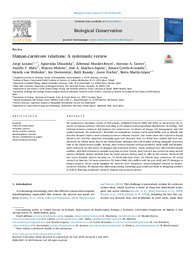Título :
Human-carnivore relations: A systematic review |
Autor :
Lozano, Jorge
Olszańska, Agnieszka 
Morales-Reyes, Zebensui
Castro, Antonio A.
Malo, Aurelio 
Moleón, Marcos
Sánchez Zapata, José Antonio 
Cortés-Avizanda, Ainara
von Wehrden, Henrik 
Dorresteijn, Ine 
Kansky PhD, Ruth 
Fischer, Joern 
Martín-López, Berta |
Editor :
Elsevier |
Departamento:
Departamentos de la UMH::Biología Aplicada |
Fecha de publicación:
2019-07-02 |
URI :
https://hdl.handle.net/11000/33891 |
Resumen :
We conducted a systematic review of 502 articles, published between 2000 and 2016, to characterize the research on human-carnivore relations according to (i) temporal and geographical distribution, (ii) biology, (iii)
relations between carnivores and humans, (iv) social actors, (v) drivers of change, (vi) management, and (vii)
applied methods. We performed a detrended correspondence analysis and Kruskal-Wallis tests to identify and
describe thematic clusters used in human-carnivore relations research. Our results show that research is deeply
biased so far, and four important knowledge gaps were detected. First, we found more studies had been conducted in the Global North than in the Global South, although risks and benefits of living alongside carnivores
exist in the Global South equally. Second, most research focused on large predators, while small and mediumsized carnivores are also source of damages and ecosystem services. Third, relations were often framed around
conflicts, with little attention to possible ecosystem services. Fourth, most research was carried out using natural
sciences methods, despite methods from the social sciences having much to offer in this context. Research fell
into seven thematic clusters focusing on: (1) North-American bears, (2) African large carnivores, (3) social
research in America, (4) meso-carnivores, (5) Asian felids, (6) conflicts with the grey wolf, and (7) damages to
human property. These results highlight the need for more integrative, social-ecological research on humancarnivore relations. We discuss how addressing existing knowledge gaps could contribute to mitigating conflicts
as well as fostering coexistence between humans and carnivore species.
|
Palabras clave/Materias:
Carnivore conservation
Ecosystem services
Human-wildlife conflicts
Interdisciplinary research
Nature's contributions to people
Social-ecological relations |
Área de conocimiento :
CDU: Ciencias puras y naturales: Biología |
Tipo de documento :
info:eu-repo/semantics/article |
Derechos de acceso:
info:eu-repo/semantics/openAccess |
DOI :
https://doi.org/10.1016/j.biocon.2019.07.002 |
Publicado en:
Biological Conservation 237 (2019) 480–4 |
Aparece en las colecciones:
Artículos - Biología Aplicada
|
 La licencia se describe como: Atribución-NonComercial-NoDerivada 4.0 Internacional.
La licencia se describe como: Atribución-NonComercial-NoDerivada 4.0 Internacional.
.png)
